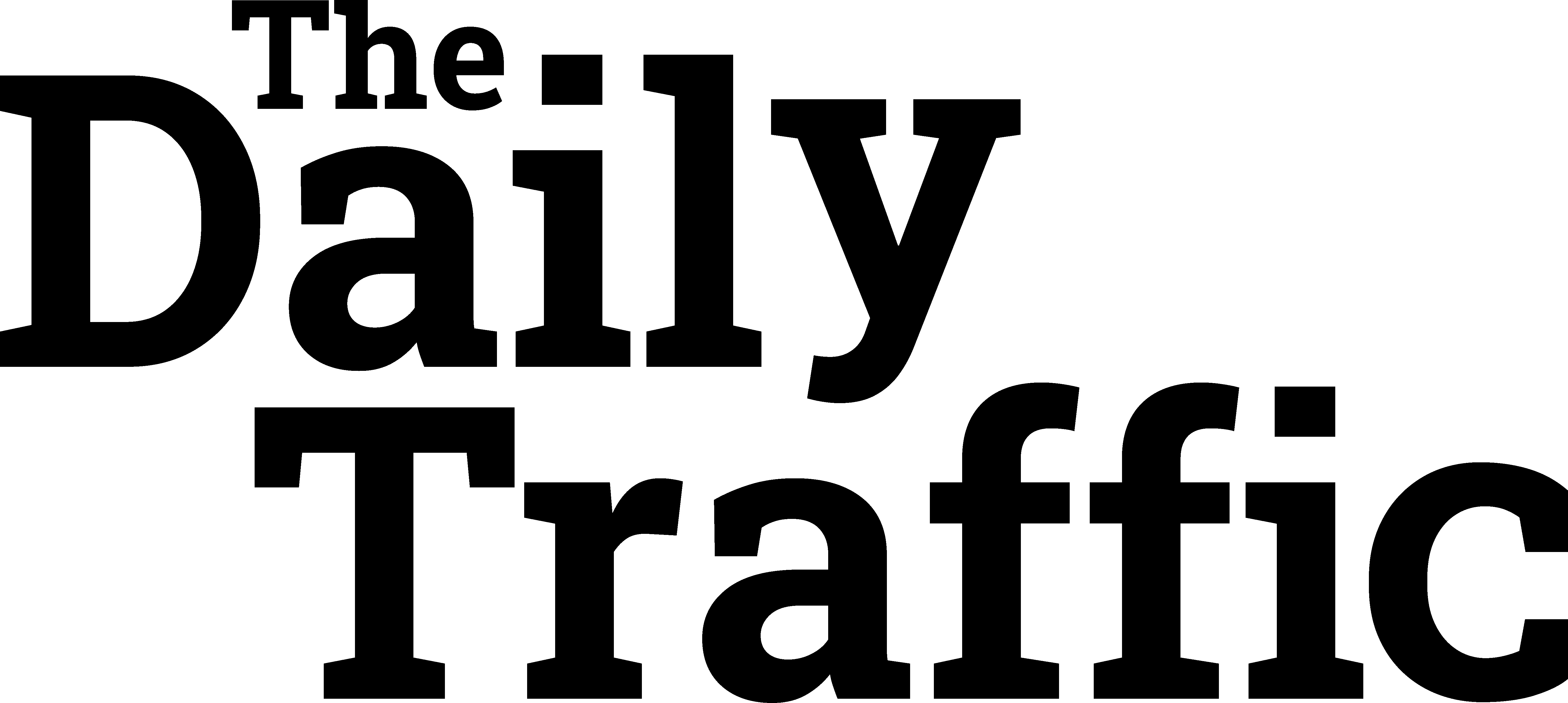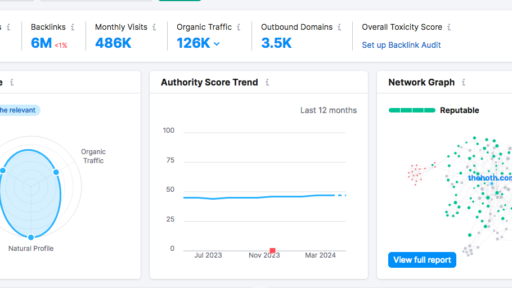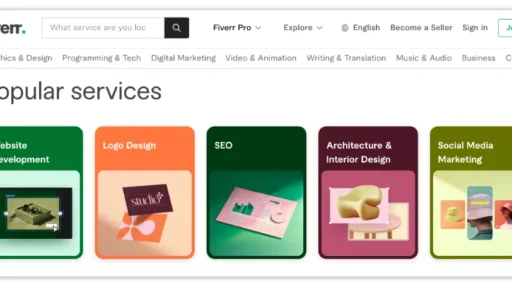Originally Posted on “SEO” – Google News by Kevin Rowe
Integrating digital PR & SEO with a full-funnel strategy both influences audience behavior and top-three rankings in search engines.
In my recent webinar with Search Engine Journal about how to earn links with digital PR, I didn’t have time to dive into the importance of the audience journey and a full-funnel strategy. This article is to remedy that.
Have you found that ranking in search engines is more difficult lately? Or maybe your link building isn’t driving the top 3 ranking it used to.
Google representatives have been actively discussing the decrease in the importance of links in Google’s algorithm.
What does this mean?
This doesn’t seem to mean links don’t work, but that links and brand mentions in the context of the audience’s journey are factors that help to break into the top 3 positions of Google – and, I believe, eventually, how you’ll make it into SGE or other high-visibility areas of search.
A full-funnel PR and SEO strategy is a method for building links and brand mentions in the context of the audience’s journey online, creating an off-page user experience.
Here’s a quick snapshot of the key takeaways you’ll find throughout this article:
- Audience Journey Insight: Your audience interacts with diverse content across platforms long before they search, influencing their perception and decision-making.
- Case Study: Lectric eBikes showcased how aligning content with the customer journey and securing authoritative links and mentions can significantly boost SEO performance, brand trust, and, ultimately, sales.
- Strategy Blueprint: This guide offers a structured approach for businesses to navigate digital marketing complexities efficiently, guiding the audience from awareness to conversion.
- Integration of Digital PR and SEO: Combining digital PR and SEO creates a cohesive journey that guides the audience from awareness to decision-making, influencing audience behavior and search engine rankings.
- Digital PR for SEO: Digital PR links and brand mentions are in the context of the audience journey and are needed to rank in the top three positions in search.
Off-Page Audience Experience With The Brand Matters
Google recommends being helpful to the audience and demonstrating Experience, Expertise, Authority, and trust (E-E-A-T) in a category to rank highly.
Your audiences are constantly looking for a solution that solves their problem or creates an opportunity, and for trusted sources to guide them through the decision-making process.
They may become aware of this problem or the solutions long before they even reach the search engines.
The chart below illustrates the sites that receive the most visits vs. those that send the most referral traffic.
This data indicates that search engines will drive the most traffic to sites, but any given audience spends a significant amount of time engaging on other platforms, digesting content about various topics.
Social and News sites get 20% and 12% of the shares of visits, respectively, while search engines drive over 70% of total traffic.
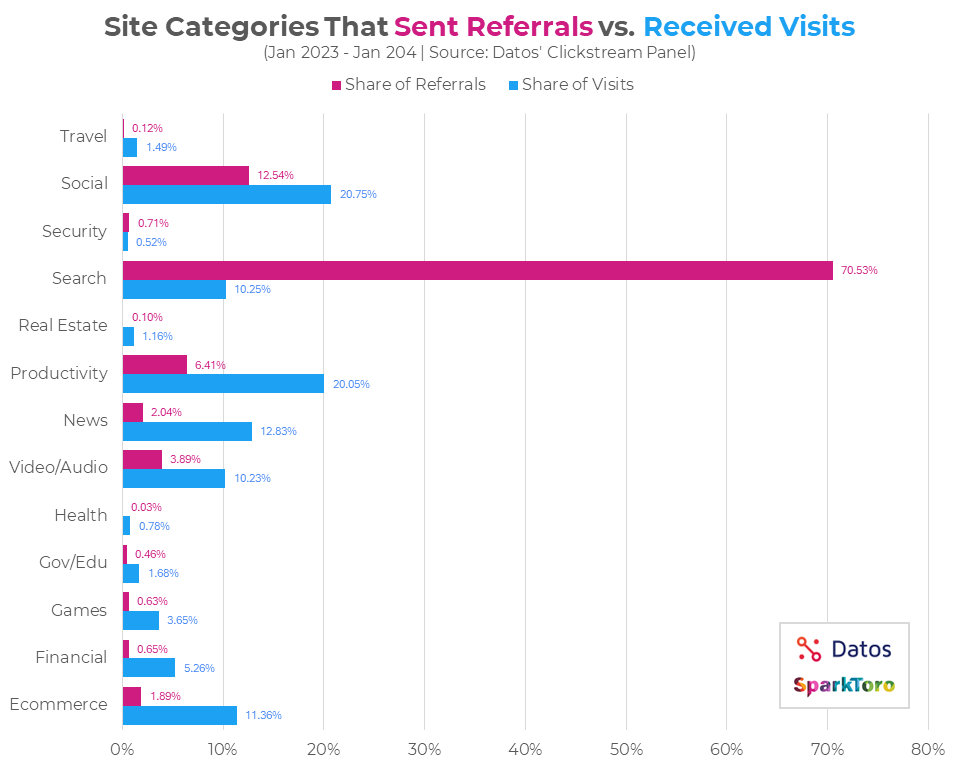 Image from Sparktoro, April 2024
Image from Sparktoro, April 2024If the audience is using several touchpoints to learn about a given product or solution, wouldn’t Google use these to determine which company is a helpful source and what its E-E-A-T is for those topics?
I had my digital PR data team at PureLinq gather data for sites that ranked in Google for a seed set of cybersecurity keywords.
We then identified all of the keywords that those sites ranked in the top three positions. From that, we gathered data about the count of brand mentions and brand search volume for each domain.
The chart below shows the number of brand mentions (x-axis), U.S. search volume for brand keywords (y-axis), and the count of keywords in the top three (bubble size). Larger bubbles mean a higher count of keywords ranked in the top three.
This data set is only for cybersecurity brands.
As brand mentions increase, the bubbles grow in size, showing that a larger number of brand mentions correlates with a higher count in the top three rankings.
Brand mentions seem to influence ranking. I know there are a large number of confounding variables in this analysis. However, the idea that Google can use these measures to identify E-E-A-T is believable.
How does this play out in the real world? To understand more, I looked at Lectric eBike.
Case Study: Lectric eBike Full Funnel PR & SEO
This case study demonstrates the power of integrating digital PR with SEO to create a cohesive and effective full-funnel marketing strategy.
The key to success was the strategic alignment of content across all stages of the customer journey, ensuring that each piece contributed to building awareness, trust, and, finally, decision-making confidence.
By securing authoritative links and mentions, Lectric eBikes not only improved its SEO performance but also established itself as a trusted brand in the eyes of consumers and search engines alike.
The rise in organic visibility and brand searches directly contributed to the overall increase in website traffic and, ultimately, sales.
This case underscores the importance of a holistic approach to digital marketing, where PR and SEO work hand in hand to guide the customer journey from awareness to conversion.
Maximum Organic Visibility
At the time of this analysis, Lectric was ranked in position 1 for “ebike” and 3 for “ebikes.”
 Screenshot from Semrush, April 2024
Screenshot from Semrush, April 2024As a result of the non-brand and brand visibility, the website went from <40,000 estimated clicks per month to over 200,000 in just about 2 years – and it still seems to be growing.
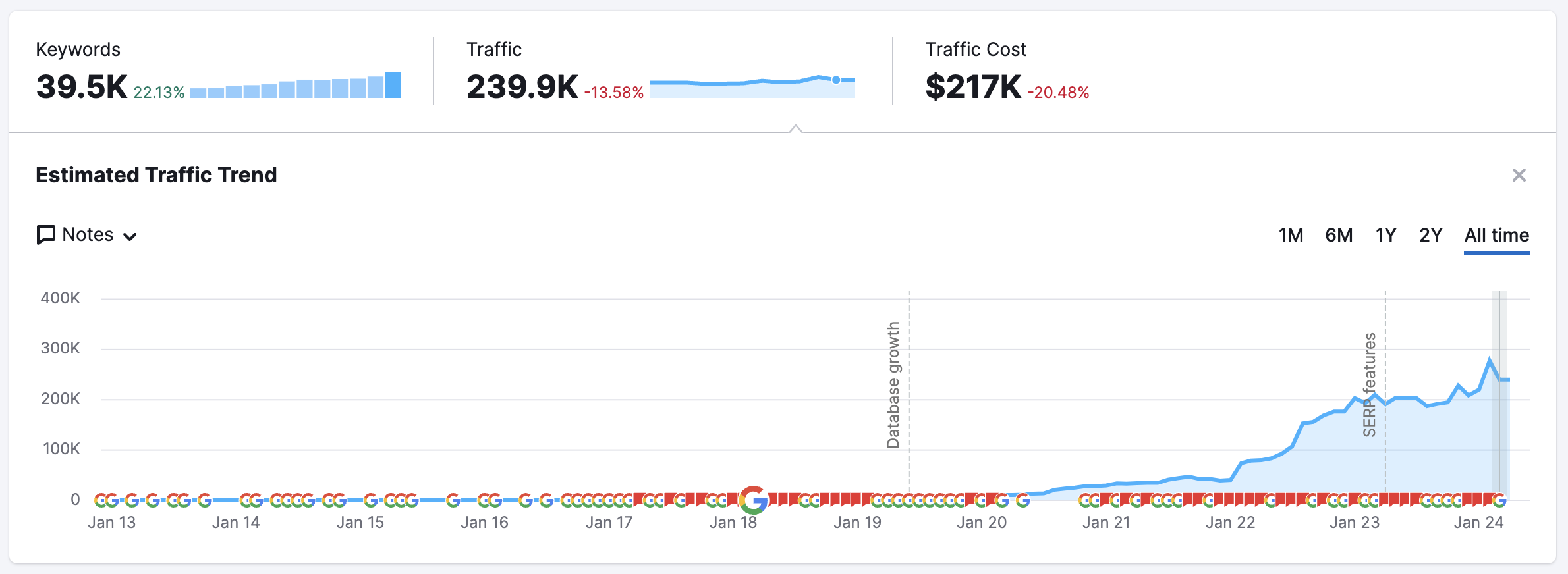 Screenshot from Semrush, April 2024
Screenshot from Semrush, April 2024How They Did It
Lectric integrated digital PR and SEO together with a full-funnel PR & SEO strategy.
Late in 2022, Lectric began to secure more media links & brand mentions.
At first glance, you might think that the growth in backlinks was the major factor in the organic traffic growth.
The famous Ahrefs chart shows a strong correlation between the number of referring domains and organic traffic growth.
However, this chart causes much confusion since it doesn’t tell the full story.
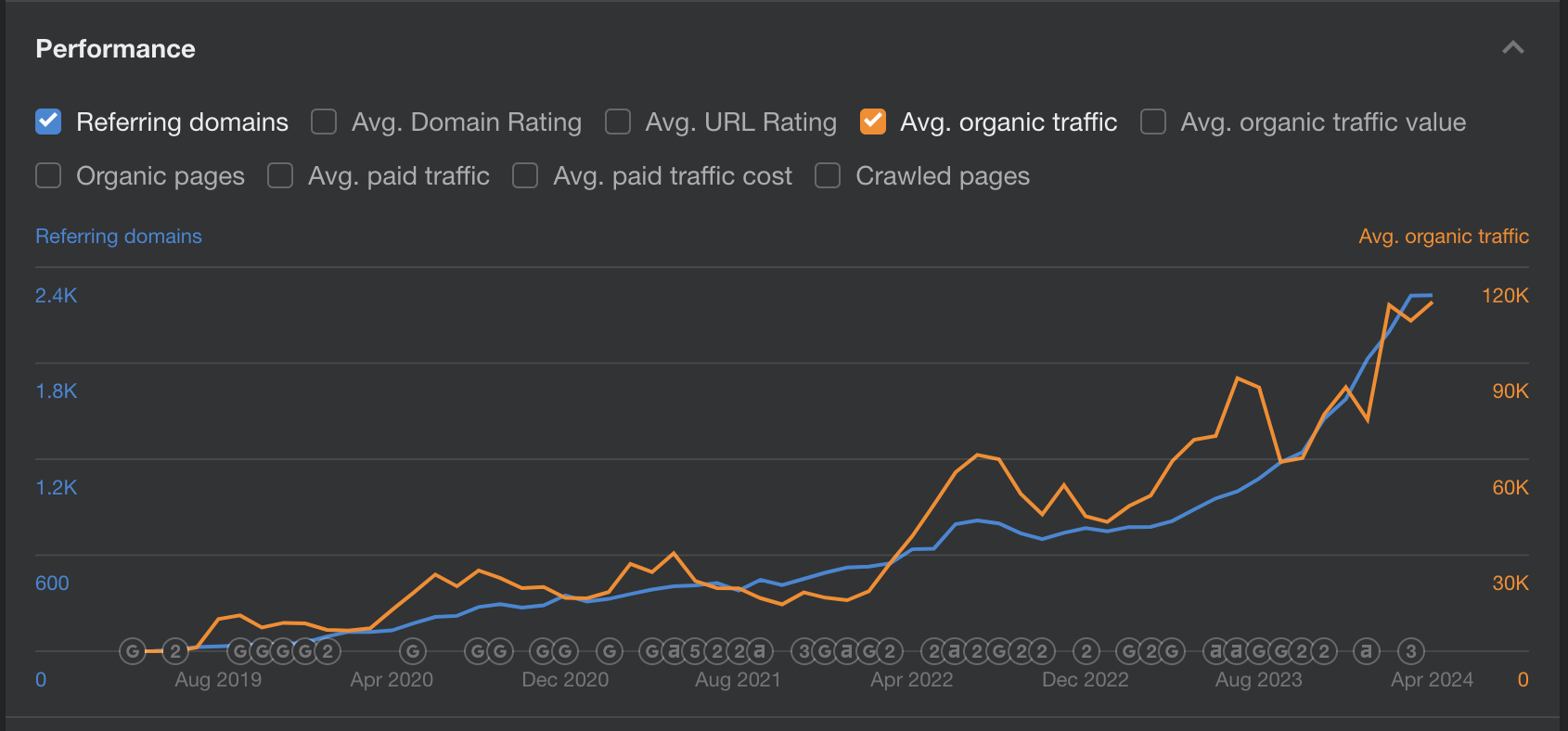 Screenshot from Ahrefs, April 2024
Screenshot from Ahrefs, April 2024Note: Semrush and Ahrefs have very different traffic estimates lately. However, any traffic estimate will be inherently inaccurate. They estimate these based on position, average monthly search volume, and estimated clickthrough rate (CTR) using Google’s keyword planner data. They all calculate CTR differently.
A little more digging with Ahref’s content explorer and BuzzSumo shows that the site saw growth in brand mentions starting in mid-2022, around the same time the organic traffic began to grow.
 Screenshot from Ahrefs, April 2024
Screenshot from Ahrefs, April 2024Lectric gained much of the organic traffic improvement by focusing on creating content for each stage of the audience journey.
The brand generated links and brand mentions based on the audience’s needs and wants, driving brand search volume.
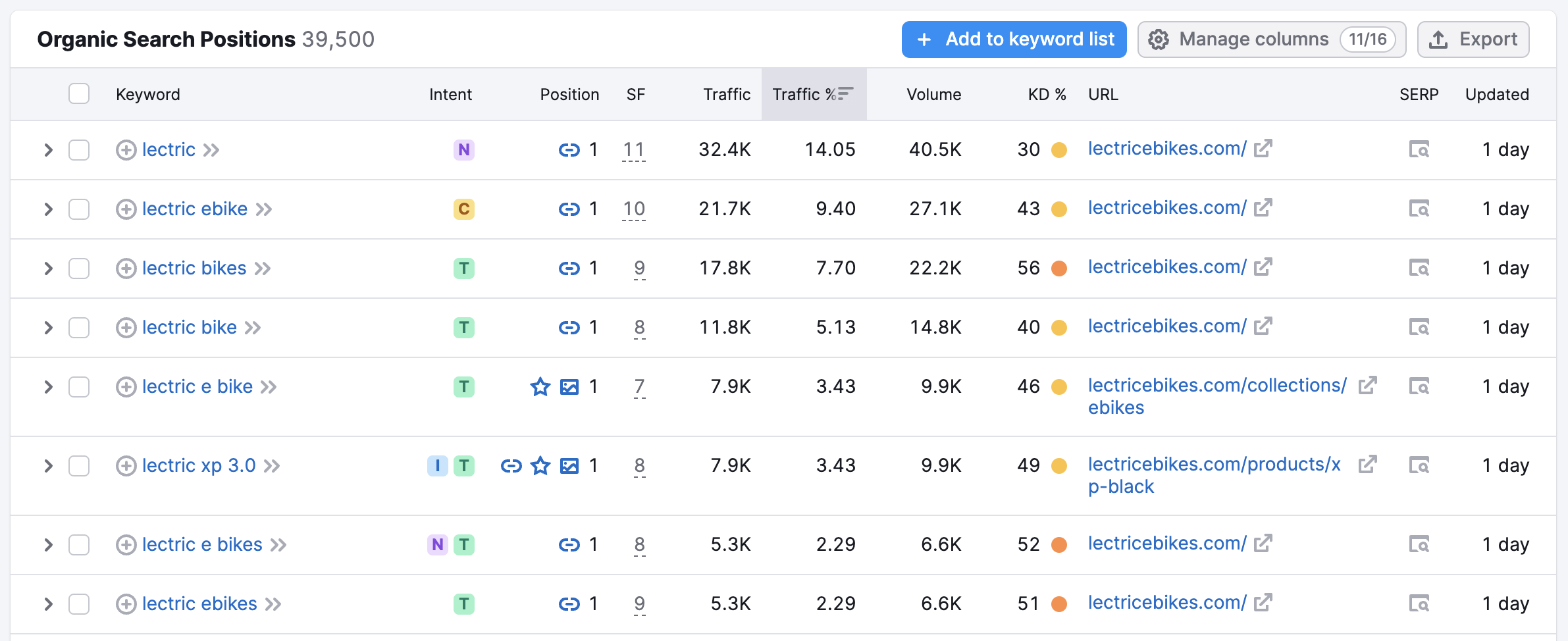 Screenshot from Semrush, April 2024
Screenshot from Semrush, April 2024Awareness
Lectric eBikes secured media coverage on environmental and technology news platforms and podcasts. This effort placed the brand in front of a broad audience, emphasizing its commitment to eco-friendliness and innovation.
Placements gained during this stage aimed to educate the audience on the environmental benefits of e-bikes, leveraging unique data and expert commentary to secure media coverage.
- Consumers are drawn to sustainable transportation, seeing e-bikes as a way to align with environmental values. (Rv Lifestyle)
- The unique, self-funded growth story of Lectric eBikes appeals to those seeking reliable and ethically operated companies. (The Verge)
- Insights from the CEO of Lectric eBikes highlight the enjoyment and utility of e-bikes, broadening the appeal to a wider audience. (Autonocast)
These placements generated topically relevant and authoritative links and brand mentions related to the company and individual expertise.
Expert commentary and unique data appeal to journalists. Lectric could have used PR outreach to pitch Lectric’s sales data and CEO commentary to obtain media coverage.
I almost exclusively use unique data and expert commentary to secure media coverage in digital PR. This is a very effective technique.
Consideration
The company obtained mentions in articles that discussed market success, customer satisfaction, and endorsements from reputable sources. This helped build trust and positioned Lectric eBikes as a reliable choice.
Coverage included comparative discussions on pricing and quality, showing how Lectric stands out from competitors. This was crucial for audiences evaluating their options.
- Lectric eBikes’ market success and customer satisfaction offer social proof, encouraging new customers to consider an e-bike. (Electrek article)
- Gaining trust from the audience by applying for awards from trusted sources (Arizona Tech Council).
- Media coverage and expert commentary discussing how they focus on a lower price over incentive programs (Axios)
- Securing links and mentions in articles that evaluate options for e-bikes (Earth911)
Digital PR Insight
The Axios article is a great example of a technique I use in data campaigns. Find data about specific states or cities that relate to your niche. Then, use that data to pitch media about a given topic.
Decision
The website’s content was tailored to answer final questions and overcome objections. This included detailed product comparisons, reviews, and clear, transparent pricing information.
By this stage, Lectric eBikes focused on ranking for both non-brand and brand-specific keywords, facilitating easy access for users ready to make a purchase decision.
The audience is actively searching Lectric by name as a result of the digital PR.
Lectic’s site has comparison, reviews, and showroom information easily accessible in the main navigation.
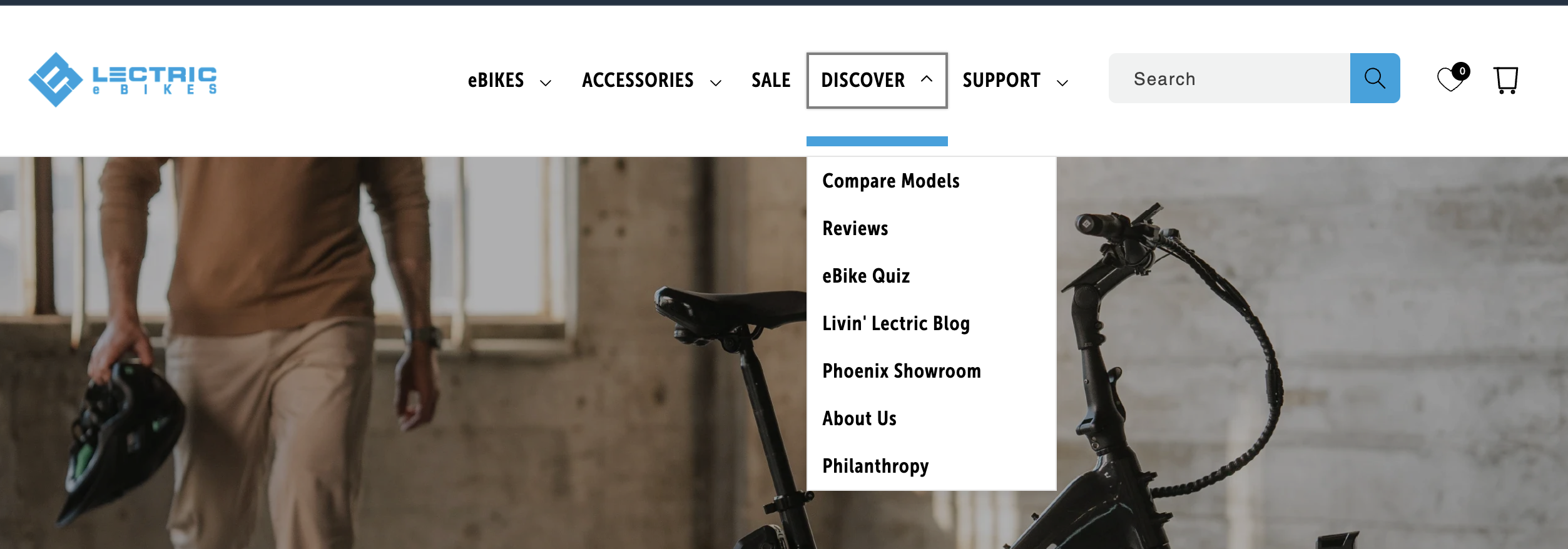 Screenshot by author, April 2024
Screenshot by author, April 2024It also has clear pricing and product options.
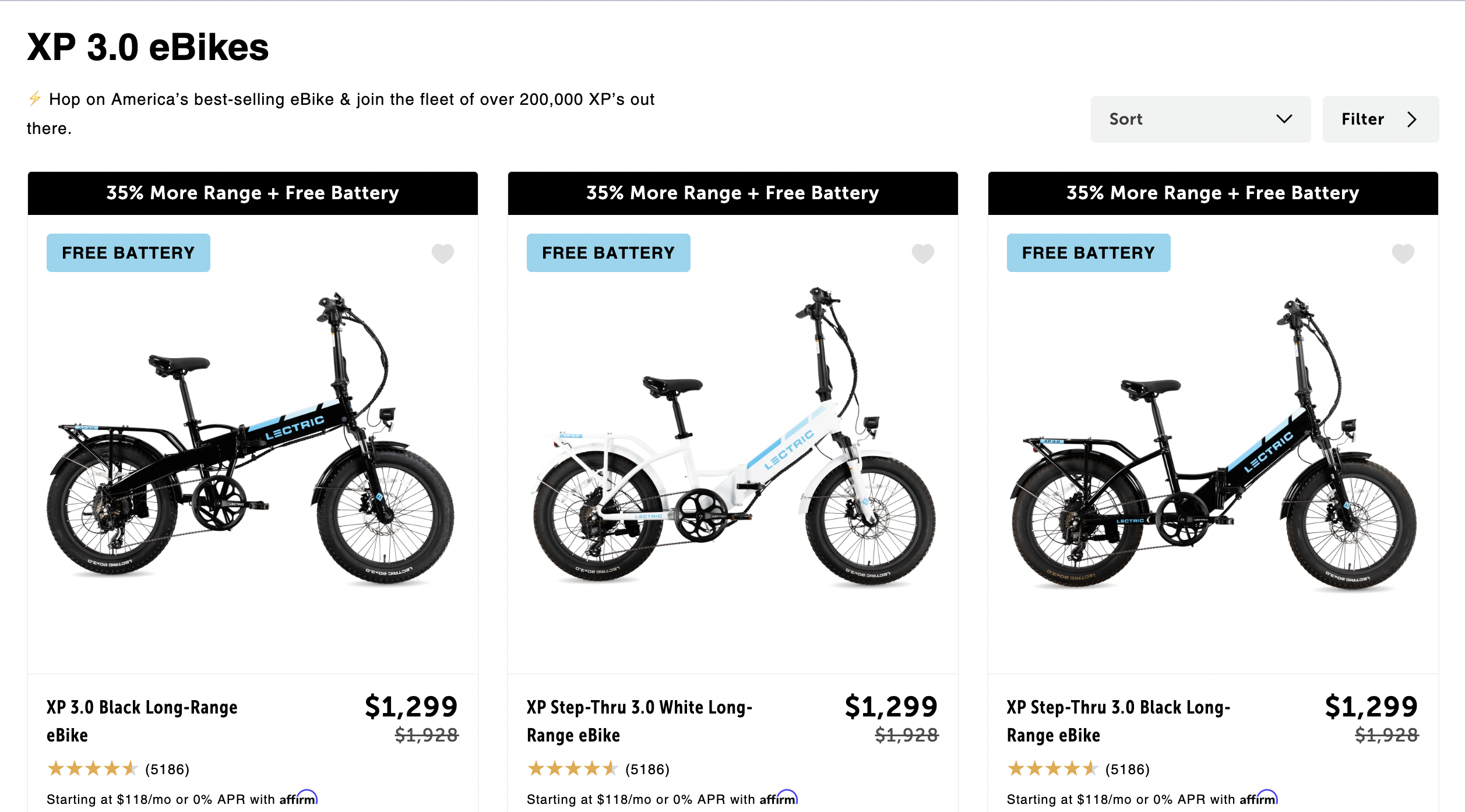 Screenshot by author, April 2024
Screenshot by author, April 2024Pro tip: Brand search for a company or product seems to have an impact on a site’s ability to rank in the top three for non-brand keywords.
If you’re unfamiliar with the audience journey, here’s an overview.
What Is Full-Funnel PR & SEO?
It’s The Stages Of The Audience Journey
A full-funnel strategy means that you create content for each stage in the audience’s journey and at the touchpoints where they are going for that type of information.
The audience journey has several stages:
- Awareness Stage: The customer becomes aware of a need, opportunity, or problem and starts looking for solutions.
- Consideration Stage: The customer evaluates different options and solutions to address their need or problem.
- Decision Stage: The customer decides on the best solution and buys or takes action.
A full-funnel strategy creates content for each stage of the audience journey.
Using e-bikes as an example:
- Situation: Consumers want to have less of a carbon footprint, and e-bikes are an option.
- Awareness: Provide graphics showing the amount of carbon an e-bike produces compared to a car.
- Considerations: Show how your e-bike compares to others in terms of carbon footprint.
- Decision: Provide information about pricing and maybe carbon savings during the checkout process.
It’s Wherever The Audience Is
The audience journey has touchpoints they use to learn or gather insights at different stages.
For example:
- Awareness Stage: The audience reads news sites, so you use digital PR to pitch unique data to journalists who cover environmental issues.
- Consideration Stage: The audience searches Google for [e-bikes with lowest carbon footprint], so you rank articles with data showing how your e-bike has the lowest carbon footprint.
- Decision Stage: The audience will search your e-bike’s brand name and purchase intent keywords, so you should focus on ranking your e-commerce pages for brand and non-brand keywords.
Targeting each stage of the audience’s journey can create topically relevant links at key touchpoints.
Designing A Full-Funnel Strategy
Designing a strategy means laying out a structured roadmap for businesses to effectively guide their target audience from awareness to decision-making.
I’m a big fan of templates that simplify processes. I created this React Workbook as part of my Digital PR for SEO Mini MBA course. You can use it to create an audience journey map, identify assets, and create an integrated PR and SEO strategy. Screenshots are below.
Create An Audience Journey Map
Start by mapping your audience’s journey, identifying key stages, touchpoints, and content needs. This will serve as the foundation for your strategy.
Understand and visualize the path your audience takes from first becoming aware of a need or problem to making a purchase decision.
The screenshot below is of an audience journey map template I created to make the process of mapping the audience journey more actionable.
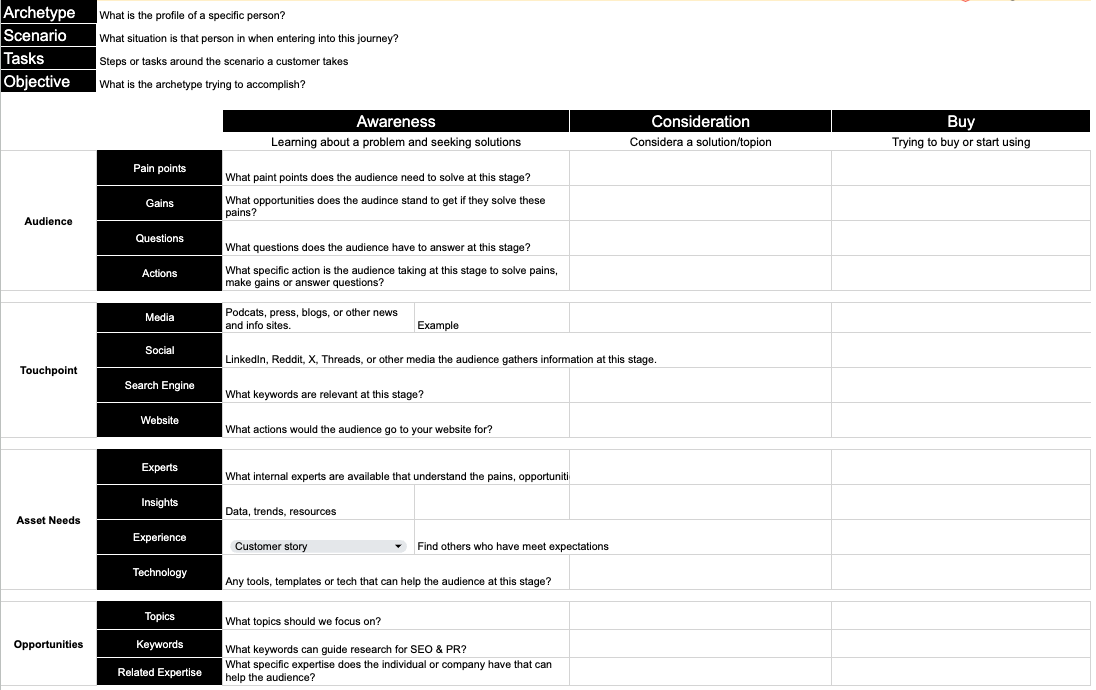 Screenshot by author, April 2024
Screenshot by author, April 2024Create Owned Assets For Each Stage
Develop a variety of unique assets and resources tailored to each stage of the audience journey, designed to engage, inform, and convert your target audience. These assets should be useful for both digital PR and SEO.
Instead of creating endless blog articles, create assets that are linkable and shareable.
- Expert commentary: Leverage internal experts and the C-suite to provide commentary on trends in the media.
- Unique data: Research unique data and insights into trends or data about the company’s growth.
- Expert resources: Have internal experts identify resources that are helpful to the audience.
- Guides: Create easy-to-use guides that help your audience accomplish something at a stage in their journey
In my webinar with SEJ, I gave the example of how my digital PR team earned links by analyzing publicly available data in manufacturing around the outsourcing of manufacturing overseas due to increasing labor costs in the US.
This idea was a result of recent media trends discussing the idea that US manufacturing may be in a recession. We did this for a CFO consultancy that worked with manufacturing companies.
Thus, these assets can show your overall expertise in a given category.
With assets in hand, start an integrated digital PR and SEO program.
Implement Integrated Digital PR And SEO
Launch a coordinated digital PR and SEO campaign that leverages external media coverage (links and brand mentions) and optimized online content to improve organic search visibility and drive targeted traffic to your website.
I use this integrated topic tour canvas to simplify the planning process.
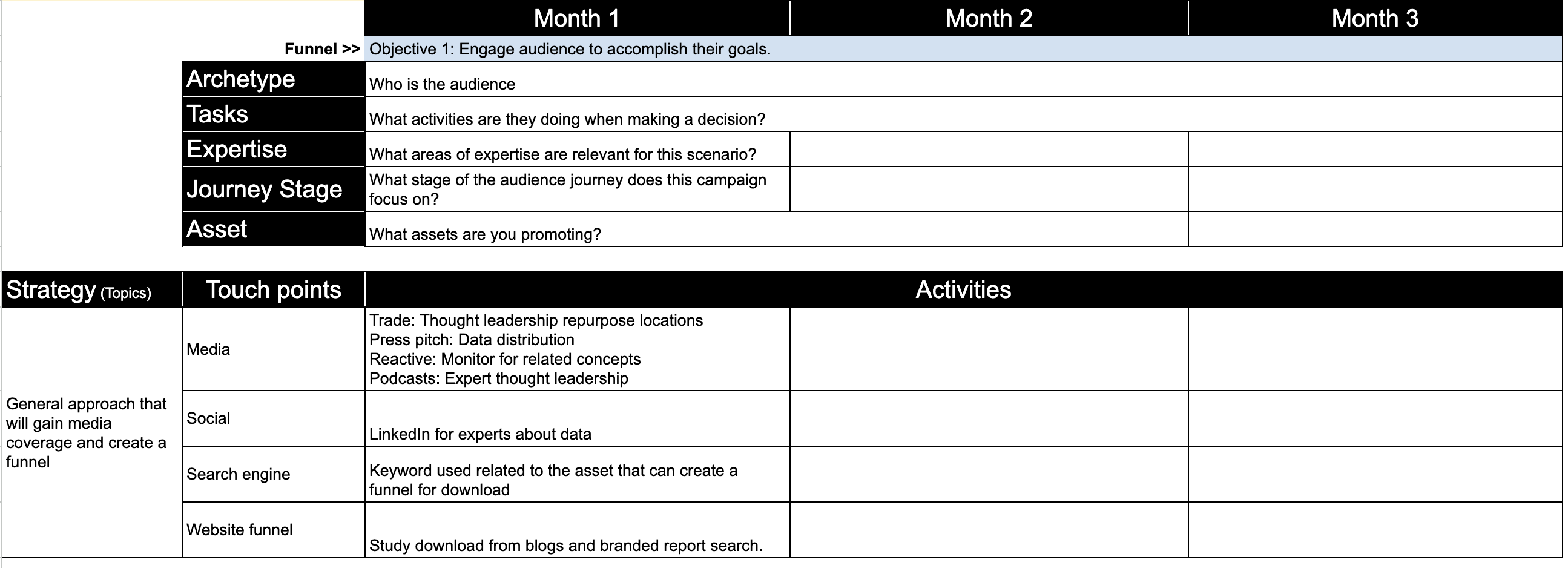 Source: Author
Source: Author- Digital PR tactics: Pitch story ideas, unique data, and expert commentary to journalists and influencers to secure media mentions and backlinks.
- SEO integration: Align your digital PR efforts with SEO by targeting keywords and phrases that have high search volumes and are relevant to the content being pitched. Use the media coverage and backlinks obtained through digital PR to enhance your website’s E-E-A-T and ranking.
- Cross-channel promotion: Amplify the reach of your media coverage and owned content through social media, email marketing, and other digital channels, ensuring that your target audience sees your brand across multiple touchpoints.
Pro Tips
- Use digital PR strategies instead of traditional link building as it builds your E-E-A-T (Experience, Expertise, Authority, and Trust) and the associated ranking factors.
- Have a technical expert or leadership contribute to on-site content and digital PR.
Leveraging Digital PR and SEO Builds A Powerful Online Presence
Implementing this full-funnel strategy requires ongoing collaboration between your PR, SEO, and content teams to ensure all efforts are aligned and focused on guiding the audience toward conversion.
By systematically mapping the audience journey, creating engaging content for each stage, and leveraging both digital PR and SEO, businesses can build a powerful online presence by ranking in the top three and driving brand search.
More resources:
Featured Image: eamesBot/Shutterstock
